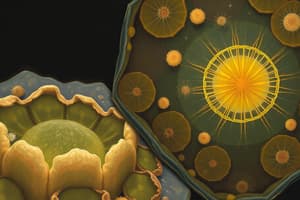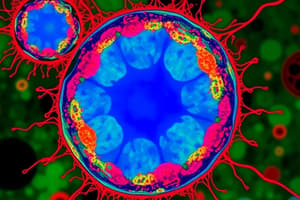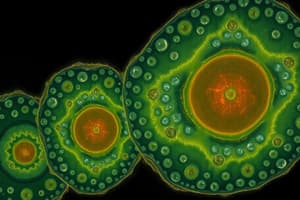Podcast
Questions and Answers
What is a fundamental principle of the cell theory?
What is a fundamental principle of the cell theory?
- Cells are the smallest unit of matter.
- New cells arise only from preexisting cells. (correct)
- All cells contain a nucleus.
- All cells have chloroplasts.
Which statement best distinguishes prokaryotic cells from eukaryotic cells?
Which statement best distinguishes prokaryotic cells from eukaryotic cells?
- Eukaryotic cells are typically smaller than prokaryotic cells.
- Prokaryotic cells have membrane-bound organelles.
- Prokaryotic cells lack a nucleus. (correct)
- Eukaryotic cells do not have a plasma membrane.
Which organelle is primarily responsible for energy production in the cell?
Which organelle is primarily responsible for energy production in the cell?
- Golgi complex
- Endoplasmic reticulum
- Mitochondria (correct)
- Ribosome
How does the structure of the plasma membrane influence material movement into and out of the cell?
How does the structure of the plasma membrane influence material movement into and out of the cell?
Which organelle is involved in the modification and packaging of proteins?
Which organelle is involved in the modification and packaging of proteins?
What is the fundamental organizing principle of biology that involves cells?
What is the fundamental organizing principle of biology that involves cells?
Which statement is NOT a part of the cell theory?
Which statement is NOT a part of the cell theory?
What type of cells do not have a membrane-bound nucleus?
What type of cells do not have a membrane-bound nucleus?
What region of a prokaryotic cell contains its genetic material?
What region of a prokaryotic cell contains its genetic material?
What is a characteristic of prokaryotic cells?
What is a characteristic of prokaryotic cells?
What structure encloses prokaryotic cells?
What structure encloses prokaryotic cells?
What type of cell would you observe if you see a membrane-bound nucleus under a microscope?
What type of cell would you observe if you see a membrane-bound nucleus under a microscope?
Which of the following best describes prokaryotic cells?
Which of the following best describes prokaryotic cells?
Study Notes
The Cell Discovery
- The cell is the smallest unit of life
- Cells can arise from pre-existing cells only
Prokaryotic Cells
- Prokaryotic cells do not have a membrane-bound nucleus
- They have a nucleoid region
- Examples of prokaryotes are bacteria and Archaea domains
Identifying Prokaryotic Cells
- Prokaryotes are unicellular and consist of only one cell
- Prokaryotes do not have a nucleus instead have a nucleoid region
The Cell Theory
- Cells make up all living things, including multicellular and unicellular organisms
- There are two basic types of cells: prokaryotic and eukaryotic
- Prokaryotic cell structure and function is different from eukaryotic cells
- All living things are made of at least one cell
- New cells can arise only from preexisting cells
What Is A Cell
- The cell is the structural unit of living things
- The cell is bounded by a plasma membrane
- The cell body contains genetic material called DNA
Studying That Suits You
Use AI to generate personalized quizzes and flashcards to suit your learning preferences.
Related Documents
Description
Explore the fundamental concepts of cell theory and the unique characteristics of prokaryotic cells in this informative quiz. Learn about the structure, function, and importance of cells as the basic units of life, and distinguish between prokaryotic and eukaryotic organisms. Test your knowledge on how cells arise and their roles in living organisms.




